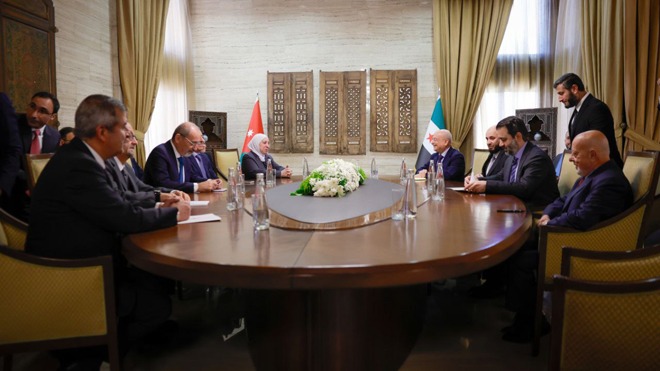Jordan, Syria Announce High-Level Economic Coordination Council
By Kardo Roj
DAMASCUS, Syria (North Press) – Syrian Foreign Minister Asaad al-Shibani announced Tuesday the formal establishment of a high-level economic coordination council between Syria and Jordan, following a joint press conference in Damascus with his Jordanian counterpart, Deputy Prime Minister and Foreign Minister Ayman Safadi.
The new body, outlined during a press briefing at Tishreen Palace, is intended to facilitate broader cooperation across sectors including transport, energy, and trade, as Syria seeks to strengthen regional ties in the aftermath of the country’s prolonged conflict.
“The economic coordination with Jordan began from the first day after liberation,” al-Shibani stated, referring to recent developments in government-controlled regions. “Jordan was more eager than us for cooperation, and lifting sanctions on Syria will further enhance joint efforts.”
The press conference followed a series of bilateral meetings, during which Syrian and Jordanian officials signed a memorandum of understanding in Amman to officially create the council. The agreement signals a step toward normalizing economic relations between the neighboring countries, whose borders have long been impacted by regional instability and cross-border trade restrictions.
Jordan’s Foreign Minister Safadi emphasized the historical and strategic ties between the two nations, highlighting shared interests in economic and regional stability.
“Jordan is Syria’s gateway to the Gulf and Arab world, and Syria is Jordan’s link to Europe,” Safadi said. “We have directives to build on the common ground we share with Syria in the spirit of brotherhood and mutual interest.”
He further stressed Jordan’s continued support for Syria during what he described as a “historic phase,” expressing his country’s readiness to assist Syria in its efforts toward stability and unity.
The announcement comes as Syria continues to navigate a complex path toward reconstruction, while much of the northeast remains under the governance of the Autonomous Administration of North and East Syria (AANES). In contrast to Damascus-led initiatives, areas under AANES have prioritized localized governance, civil services, and partnerships with international actors on humanitarian and security fronts.
Although the new Syrian-Jordanian council does not directly impact northeastern Syria, regional observers note that such developments may indirectly influence broader trade and transit dynamics, especially across the M4 highway corridor and surrounding economic zones.
Further meetings between technical teams from both countries are expected in the coming weeks to implement the terms of the agreement and begin joint infrastructure assessments.

